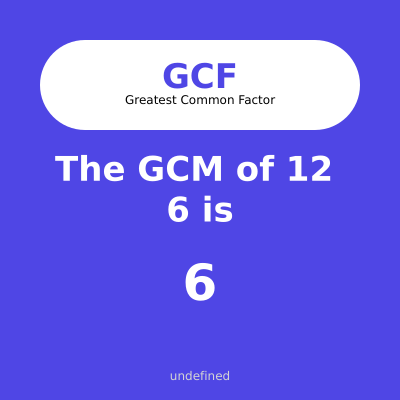The GCF (greatest common factor) of the numbers 12 and 6 is 6
On this page we are calculating the Greatest Common Factor of 12 and 6
How to find the Greatest Common Factor of 12 and 6?
There are many methods we can apply to calculate the GCF of 12 and 6.
In our first method, we'll find out the prime factorisation of the 12 and 6 numbers.
In our second method, we'll create a list of all the factors of the 12 and 6 numbers.
These are the numbers that divide the 12 and 6 numbers without a remainder. These are the numbers that divide the 12 and 6 numbers without a remainder. Once we have these, all we have to do is to find the one that is the biggest common number from the 2 lists.

Now let's look at each methods, and calculate the GCF of 12 and 6.
Methods of calculating the GCF of 12 and 6:
Method 1 - Prime Factorisation
With the prime factorisation method, all we have to do is to find the common prime factors of 12 and 6, and then multiply them. Really simple:
With the prime factorisation method, all we have to do is to find the common prime factors of 12 and 6, and then multiply them. Really simple:
Step 1: Let's create a list of all the prime factors of 12 and 6:
Prime factors of 12:
As you can see below, the prime factors of 2, 2, and 3.
Let's illustrate the prime factorization of 12 in exponential form:
Prime factors of 6:
As you can see below, the prime factors of 2 and 3.
Let's illustrate the prime factorization of 6 in exponential form:
Step 2: Write down a list of all the common prime factors of 12 and 6:
Step 3: All we have to do now is to multiply these common prime factors:
Find the product of all common prime factors by multiplying them:
Method 2 - List of Factors
With this simple method, we'll need to find all the factors of 12 and 6, factors are numbers that divide the another number without a remainder, and simply identify the common ones, then choose which is the largest one.
Step 1: Create a list of all the numbers that divide 12 and 6 without a remainder:
List of factors that divide 12 without a remainder are:
List of factors that divide 6 without a remainder are:
Step 2: Identify the largest common number from the 12 and 6 lists above:
As you can see in the lists of factors from above, for the numbers 12 and 6, we have highlighted the number 6, which means that we have found the Greatest Common Factor, or GCF.
According to our calculations above, the Greatest Common Factor of 12 and 6 is 6
Method 3 - Euclidean algorithm
The Euclidean algorithm says that if number k is the GCM of 6 and 12, then the number k is also the GCM of the division remainder of the numbers 6 and 12.
We follow this procedure until the reminder is 0.
The Greatest Common Divisor is the last nonzero number.
Step 1: Sort the numbers into ascending order:
Step 2
Take out, from the set, the smallers number as you divisor: 6
The remaining set is: 12
Find the reminder of the division between each number and the divisor
Gather the divisor and all of the remainders and sort them in ascending order. Remove any duplicates and 0. Our set is: 6
Repeat the process until there is only one number in the set.
Step 3: Take the remaining number from our set
Method 4 - Binary Greatest Common Divisor algorithm
The binary GCD algorithm, also known as Stein's algorithm or the binary Euclidean algorithm, is an algorithm that computes the greatest common divisor of two nonnegative integers. Stein's algorithm uses simpler arithmetic operations than the conventional Euclidean algorithm; it replaces division with arithmetic shifts, comparisons, and subtraction.
Although the algorithm in its contemporary form was first published by the Israeli physicist and programmer Josef Stein in 1967, it may have been known by the 2nd century BCE, in ancient China.
Step 1: Sort the numbers, and set initial GCF equal to 1
Step 2: All of the numbers are even. Divide all of them by 2 and multiply your GCF by 2. Remove the duplicates and sort. Repeat the process if all the numbers are even:
The resulting list: 3, 6
Step 3: Divide all of the remaining even values by 2, remove the duplicates and sort. Repeat the process if there are even numbers in the list:
The resulting list: 3